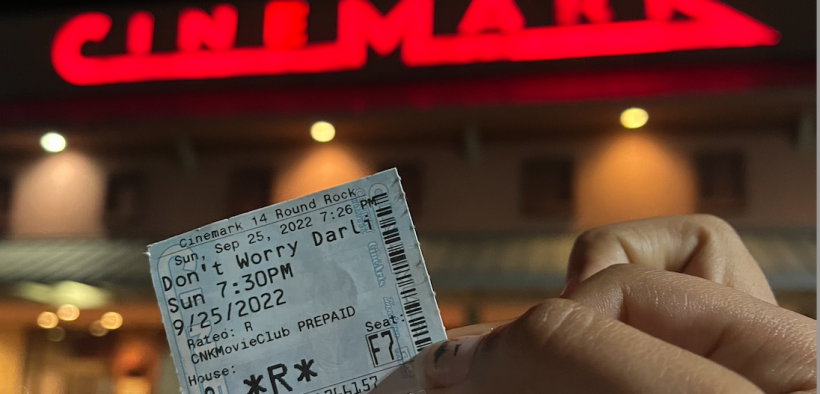Don’t Worry Darling: Another Empty Feminist Parable
Share

If you’re a fan of mind-boggling cinema such as Stranger Things, Locke and Key, Inception, or The Matrix, don’t waste your time or money on this movie. Psychological thrillers are either a hit or miss, and “Don’t Worry Darling” is definitely a miss. Harry Styles, the dreamy singer that drew most of the movie publicity, could not make up for the lazy screenwriting and poor directing. The film reminded me of a bootleg version of The Matrix, or perhaps an acid-trip induced adaptation of Brave New World. This movie is what you tell your friend when she turns up with some-underdog-lacks-ambition type Tinder date, and you want to be polite: “he’s got…potential.”
Don’t Worry Darling is a newly released psychological thriller featuring Harry Styles who plays Jack, the male protagonist. Florence Pugh plays the female protagonist, and Olivia Wilde is cast as supporting character Bunny, who was also the director (might be why the execution of the movie sucked???) Most people know about this movie from the drama that has shrouded its production and infiltrated social media platforms such as Tik Tok and Instagram. Some of the main publicity has come from the twisted love triangle between Florence, Olivia, and Harry. Olivia Wilde, the director, cast herself into the movie and had more on-screen time than Harry Styles. She also wound up playing one of the main heroines during the show; both of these things sparked a social media uproar contributing to the publicity drama.
The movie unfolded as some feminist nightmare of a utopia. The story was set in the 1950’s and although Pugh’s character embodied traditional housewife notions, she interestingly didn’t want kids. This, however, was one of the movie’s few elements that actually tied to a cohesive point and theme. The story goes on to depict a group of housewives living in a romanticized, shoo-bop neighborhood in the middle of nowhere who spend all their time doting on their husbands who work at a classified location doing God-knows-what. It’s no surprise when the main character Alice begins to question the mystery surrounding her husband’s clandestine career ruffling some feathers. Some creepy ballerinas dance, and as Alice advances towards uncovering the truth to her utopia seeming life, violence ensues. The secret is uncovered. Wives overturn their husbands. The movie ends abruptly with so many unanswered questions that the old southern woman sitting next to me said, “Are you kidding me that’s the ending. That’s some freakin’ bullshit.”
Don’t Worry Darling seemed like a failing feminist attempt at science fiction. I mean, men had to trap their wives into a simulation in order to be able to give them an orgasm…come on. Where is the originality? The first half of the movie displayed an oversexed, fantasized relationship between Jack and Alice. Even before the simulation was revealed I was thinking, “This has to be satire right?” There’s no way a real woman would spend hours hunched over a stove, only to have her picture-perfect, home-cooked meal thrown off the table by her husband who just-so-happens to perfectly satisfy her sexual desires. (Right??) Wilde chose to expand on an exhausted, easy-to-digest cinematic theme: men pride themselves on their sexual abilities when 80% of women actually fake their orgasms. We get it. For all Wilde’s effort to drill that theme into the audience’s heads, maybe she needs to get drilled herself. Styles obviously isn’t satisfying her.
Sex rants aside, I believe this movie definitely lacked depth and connection to its themes. However, Wilde managed to sufficiently execute some of them. For example, Bunny, played by Olivia Wilde, was the only housewife that chose the simulation out of the grief and emptiness of losing her children in the real world. This exemplifies the complexity of motherhood struggles; sometimes being a mother can be suffocating, especially for those who lose their children to death or relational strain.
Overall, this movie was another point illustrating why you should not direct a sci-fi film unless you’re Christopher Nolan. Psychological thrillers require a lot of depth to skillfully execute. Yes, they are meant to be mind-boggling, however that is not an excuse for an abrupt and quite honestly lazy ending. We all know that “up-for-interpretation” or “open-ending” is just another synonym for a half-assed screen write. I’ve seen people fail this genre time and time again by failing to fully weave ideas together, neglecting to fully elaborate upon symbolic significance. They then call the consequential plot confusion “mind-boggling.” I hate to break it to you Katie Silberman, that’s just bad writing. I wouldn’t be surprised if the notes I jotted down throughout the film were more thought out than the director’s plan when making the film. If you’re only interested in this movie for Styles, just go see him in concert; they gave him a ratty look anyways–but I mean, isn’t that all pitiful tinder dates?
